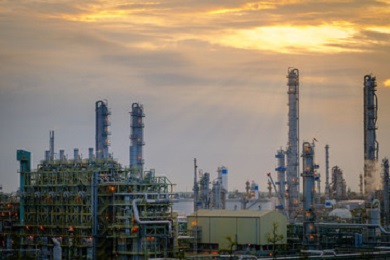Naphtha, also known as crude gasoline, is a petroleum product obtained by distillation and separation at different temperatures and pressures in an oil refinery. Through thermal cracking, naphtha becomes the basic raw material for petrochemical products such as ethylene and propylene.
The naphtha cracking furnace consists of three sections: the convection section, the crossover section, and the radiant section.
The raw naphtha is thermally cracked as follows:
– Preheated in the convection section and mixed with dilution steam
– Heated to a temperature just before the reaction starts in the crossover section
– Sent into the reaction tubes (cracking tubes) in the radiant section, where it is thermally cracked by radiant heating from radiant burners arranged on the side walls of the furnace.

